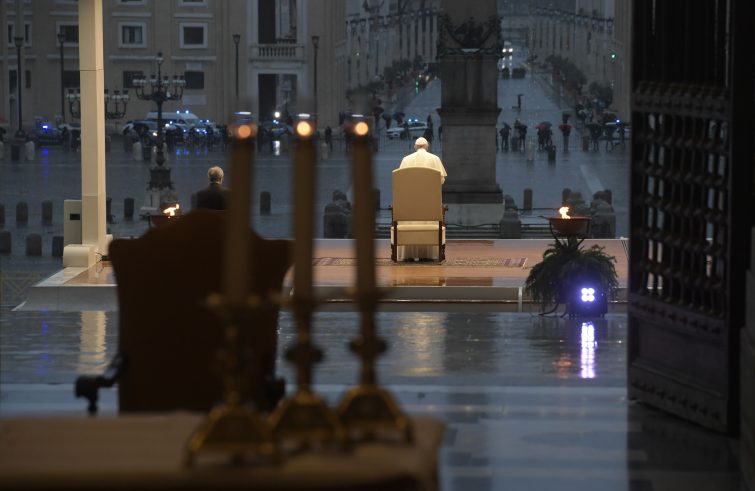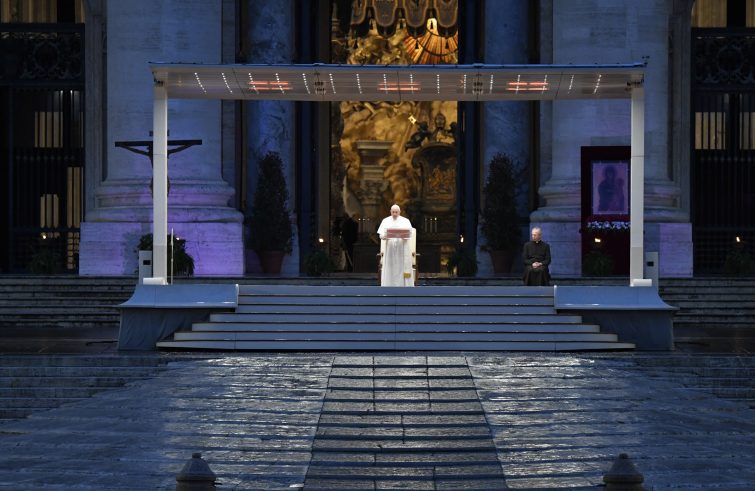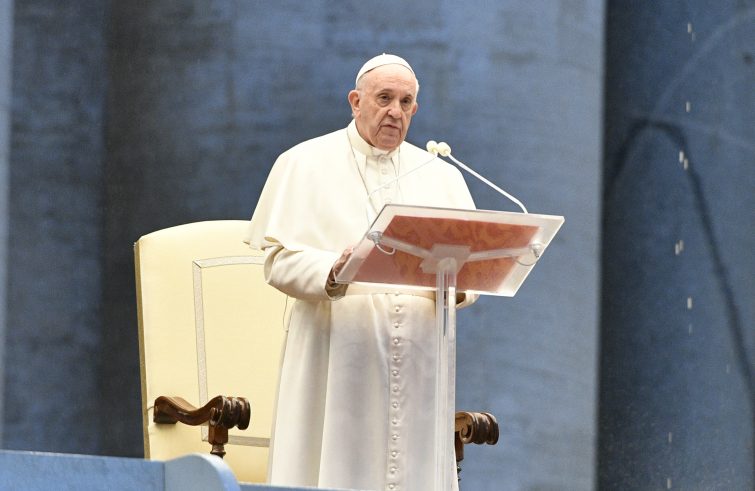
The Pope praying alone on the parvis of the Vatican Basilica, facing an empty, rain-soaked St. Peter’s Square. It had never happened before. This snapshot, already recorded in history, epitomizes the scale of the Covid-19 pandemic that is disrupting the whole world. An unprecedented event occurring at the most dramatic time since the Second World War, as Francis himself defined it. When, seven years ago, immediately after his election, the 265th successor of Peter appeared from the Lodge, announcing that he, Bishop of Rome conceived his pontificate as a path jointly undertaken with the people, one next to the other, he would never have imagined that one day he would stand alone in that same square. A shepherd “with the smell of sheep” without his flock because of the ongoing war against an invisible enemy. And yet, the square that was broadcast worldwide, barren and deserted, is in fact incommensurably fuller than the square of the most crowded events. In homes worldwide, “cum Petro and sub Petro”, millions of people simultaneously prayed together, watched over by the image of the “Salus Populi Romani” and the Crucifix of San Marcello al Corso, invoked for the liberation of the eternal city from the plague of 1522, in front of which Francis prayed on March 15 after a pilgrimage on foot from Santa Maria Maggiore, alone, in empty Rome. Another snapshot that, like today’s, has gone and will continue being circulated throughout the world.

“From this place that tells of Peter’s rock-solid faith, I would like this evening to entrust all of you to the Lord, through the intercession of Mary, Health of the People and Star of the stormy Sea”,
Francis said in the final remarks of the homily, concluded with an act of entrustment to the Holy Virgin. “From this colonnade that embraces Rome and the whole world, may God’s blessing come down upon you as a consoling embrace”, the Pope’s words: “Lord, may you bless the world, give health to our bodies and comfort our hearts. You, Lord, will not leave us at the mercy of the storm.” Finally, the Pope imparted the Blessing “Urbi et Orbi”, offering the opportunity for plenary indulgence.
“For weeks now it has been evening”,
the first snapshot of the present moment, exceptional in its gravity, just as unprecedented is the scenario where Francis raises his plea: “Thick darkness has gathered over our squares, our streets and our cities; it has taken over our lives, filling everything with a deafening silence and a distressing void, that stops everything as it passes by; we feel it in the air, we notice in people’s gestures, their glances give them away.”

“We find ourselves afraid and lost”, Francis continues:
“On this boat… are all of us.”
The tempest of the coronavirus, just like the storm that surprised Jesus and the disciples on the sea of Galilee, “exposes our vulnerability and uncovers those false and superfluous certainties around which we have constructed our daily schedules, our projects, our habits and priorities.” In the tempest, that unleashed the inner and outer pandemics, “the façade of those stereotypes with which we camouflaged our egos, always worrying about our image, has fallen away, uncovering once more that (blessed) common belonging, of which we cannot be deprived: our belonging as brothers and sisters.”
At the heart of the homily we find the contrast, in the form of a denunciation, between the world in which we have lived so far and the world revealed to us by a hitherto unknown virus: “In this world, that You love more than we do, we have gone ahead at breakneck speed, feeling powerful and able to do anything. Greedy for profit, we let ourselves get caught up in things, and lured away by haste. We did not stop at your reproach to us, we were not shaken awake by wars or injustice across the world, nor did we listen to the cry of the poor or of our ailing planet. We carried on regardless, thinking we would stay healthy in a world that was sick.” For Francis, this Lenten period is an exceptional time “to choose what matters and what passes away, a time to separate what is necessary from what is not. It is a time to get our lives back on track with regard to you, Lord, and to others.” “We can look to so many exemplary companions for the journey, who, even though fearful, have reacted by giving their lives.” Francis said:
“Our lives are woven together and sustained by ordinary people – often forgotten people – who do not appear in newspaper and magazine headlines nor on the grand catwalks of the latest show, but who without any doubt are in these very days writing the decisive events of our time: doctors, nurses, supermarket employees, cleaners, caregivers, providers of transport, law and order forces, volunteers, priests, religious men and women and so very many others who have understood that no one reaches salvation by themselves.”

“How many people every day are exercising patience and offering hope, taking care to sow not panic but a shared responsibility”, Francis exclaimed: “How many fathers, mothers, grandparents and teachers are showing our children, in small everyday gestures, how to face up to and navigate a crisis by adjusting their routines, lifting their gaze and fostering prayer. How many are praying, offering and interceding for the good of all. Prayer and quiet service: these are our victorious weapons.” “We are not self-sufficient; by ourselves we founder: we need the Lord, like ancient navigators needed the stars,” the Pope explained urging us to “invite Jesus into the boats of our lives”; for “with him on board there will be no shipwreck. Because this is God’s strength: turning to the good everything that happens to us, even the bad things. He brings serenity into our storms, because with God life never dies.” Even in these hours “when everything seems to be floundering.”










